Challenges of College Life with Autism
Bridging the Gap: Supporting Autistic Students in Higher Education
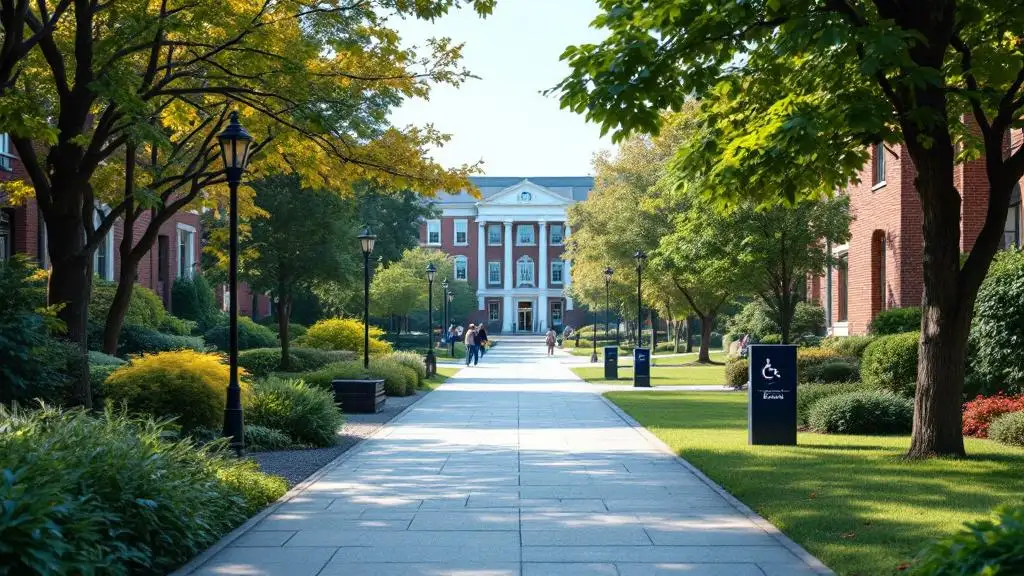
Understanding the Unique Challenges and Opportunities for Students with Autism in College
As enrollment of students with autism spectrum disorder (ASD) in higher education continues to grow, it becomes increasingly important to understand the distinct challenges they face and explore effective strategies to support their success. While college can offer independence and personal growth, autistic students often encounter hurdles related to sensory sensitivities, executive functioning, social interaction, and mental health. This article delves into the complexities of navigating college life with autism, examines current support systems, and highlights promising practices and programs designed to foster inclusive, supportive environments.
Common Challenges Faced by College Students with Autism
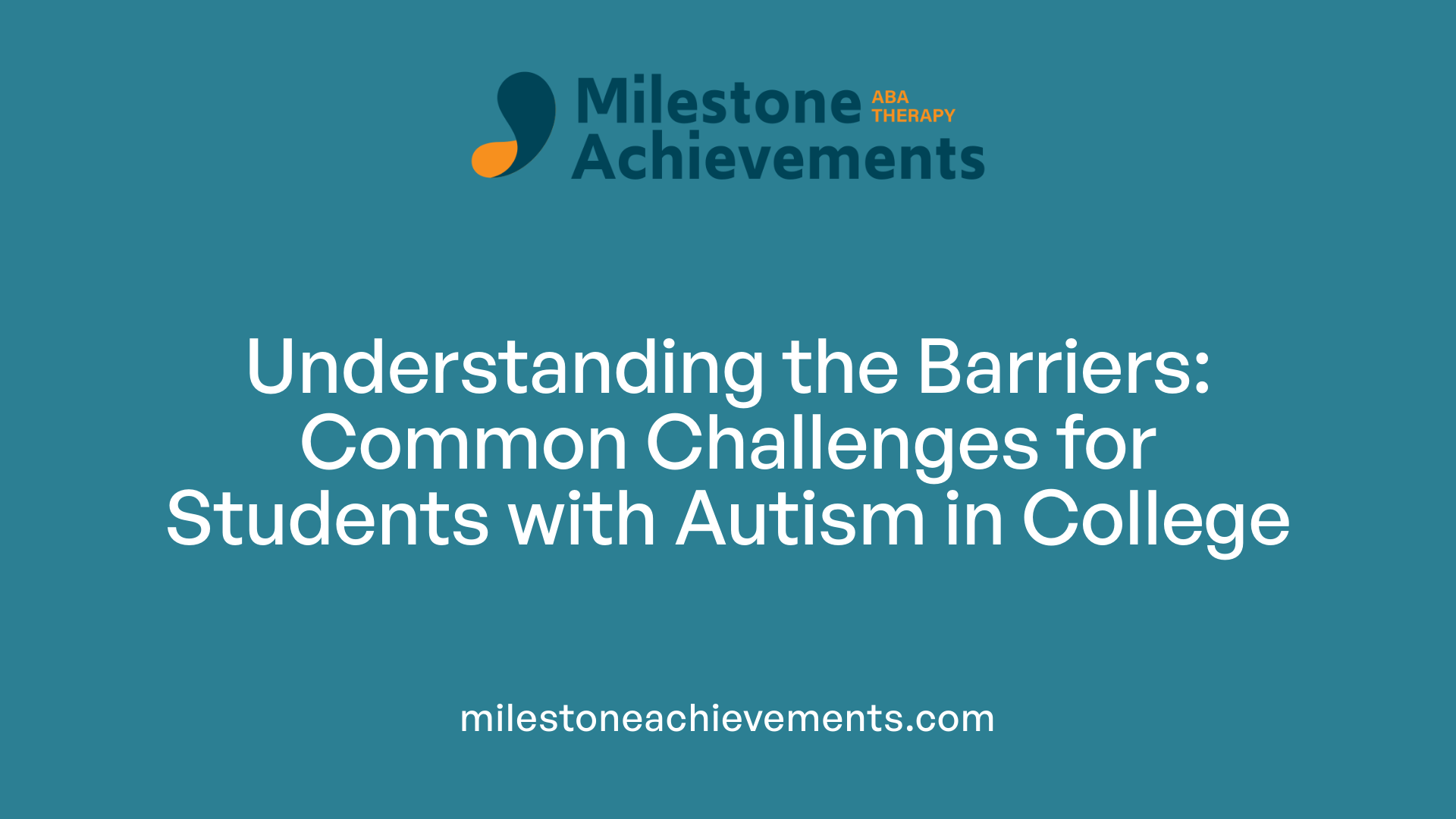
What are the common challenges faced by college students with autism?
Students with autism encounter various hurdles during their college journey that can impact their academic success, social integration, and overall well-being. Sensory processing difficulties are prevalent, with over 94% experiencing sensitivities to visual, auditory, or tactile stimuli. For example, noisy campus environments, harsh lighting, and crowded spaces can lead to sensory overload, overwhelming students and causing stress.
Executive functioning challenges are also widespread. These include problems with planning, organization, time management, and self-regulation. Many students struggle to juggle coursework, deadlines, and personal responsibilities, which can negatively affect academic performance despite high intellectual abilities.
Social and communication barriers are significant. Students may find it hard to interpret social cues, make eye contact, or participate in group activities, leading to feelings of isolation and loneliness. Difficulties with pragmatic language—such as understanding sarcasm, idioms, or jokes—further complicate social interactions. These issues are often compounded by social anxiety and limited peer relationships.
The transition from high school to college introduces a substantial shift in support structures. Unlike high school, where IEPs and direct supervision provide extensive assistance, college relies heavily on self-advocacy. Students need to learn how to access accommodations independently, which can be daunting without prior experience. The lack of structured routine and immediate access to supports often results in increased stress and challenges.
Mental health issues are common. Anxiety and depression rates are notably higher among students with autism, affecting their ability to participate fully in college life. The stress of managing coursework, social expectations, and sensory sensitivities can exacerbate these conditions, sometimes leading to burnout.
In addition, academic challenges include difficulties with coursework that rely on abstract reasoning and critical thinking. Heavy course loads, unfamiliar teaching styles, and inaccessible materials can hinder academic achievement. Many students report struggles with homework completion, exam performance, and managing heavy workloads.
Understanding these common challenges emphasizes the need for tailored support strategies, early preparation, and inclusive campus environments. Targeted interventions can significantly improve students' college experiences and outcomes.
The Impact of Sensory Processing and Executive Functioning on Academic Performance
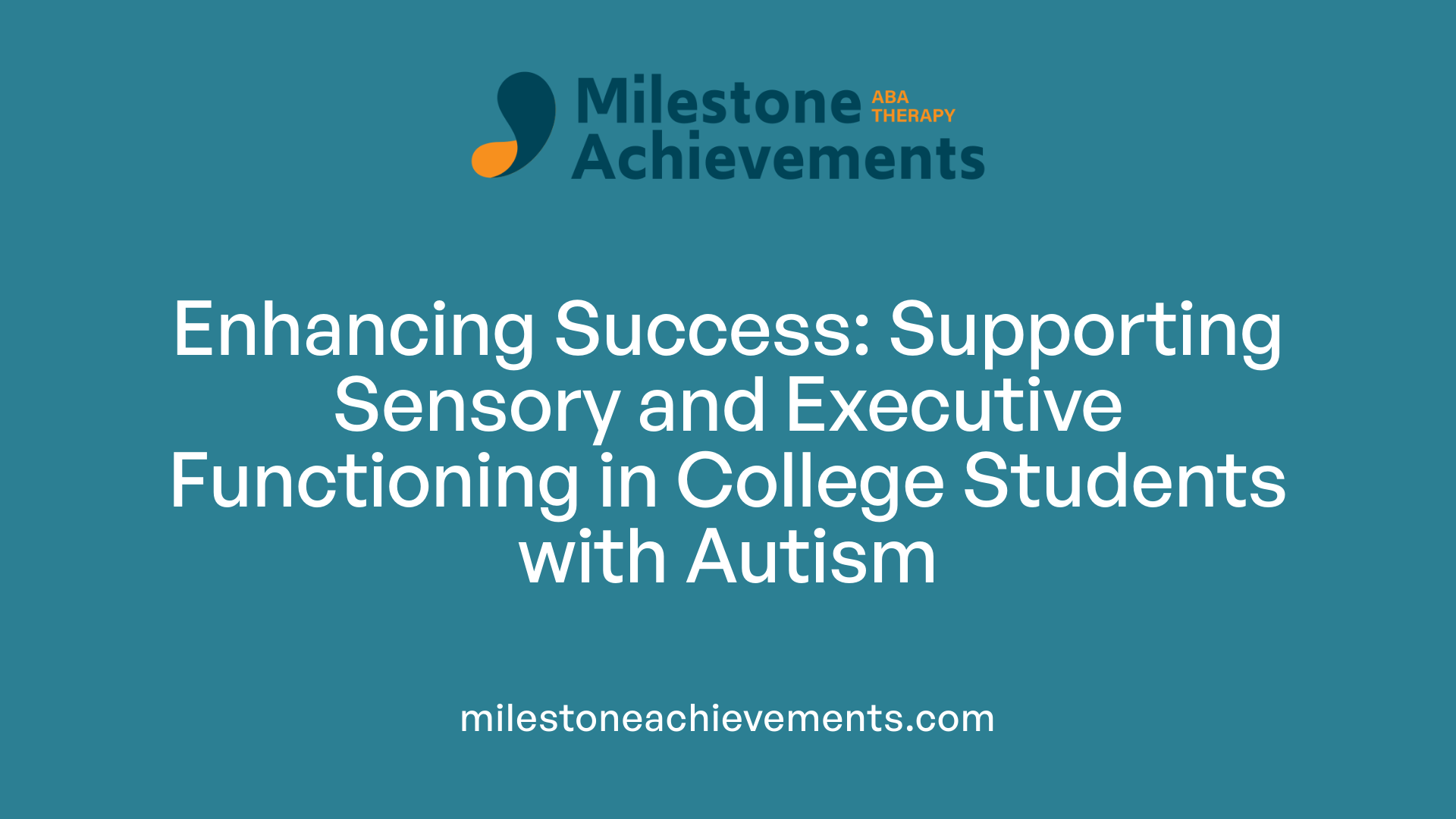
What role do sensory processing and executive functioning play in college success for students with autism?
Sensory processing difficulties, such as hyper-sensitivity or hypo-sensitivity to stimuli like noise, bright lights, and textures, can be overwhelming in busy college environments. These challenges often lead to discomfort and distraction, making it harder for students with autism to concentrate on their coursework. For example, loud lecture halls or harsh lighting can cause sensory overload, resulting in increased stress and reduced focus.
At the same time, executive functioning deficits — including issues with planning, organization, time management, and self-regulation — can significantly hinder academic performance. Students may struggle to meet deadlines, prioritize tasks, or stay organized, leading to missed assignments and feelings of being overwhelmed. These combined difficulties can undermine student confidence and academic success.
To support these students, colleges need to understand that sensory and cognitive challenges are interconnected. Tailored interventions, such as offering sensory-friendly spaces and providing organizational tools like visual schedules, planners, and alarms, are vital. Recognizing how sensory sensitivities impact daily functioning allows institutions to create more inclusive environments that promote better learning outcomes and reduce barriers.
Mental Health and Emotional Well-being in College Students with Autism
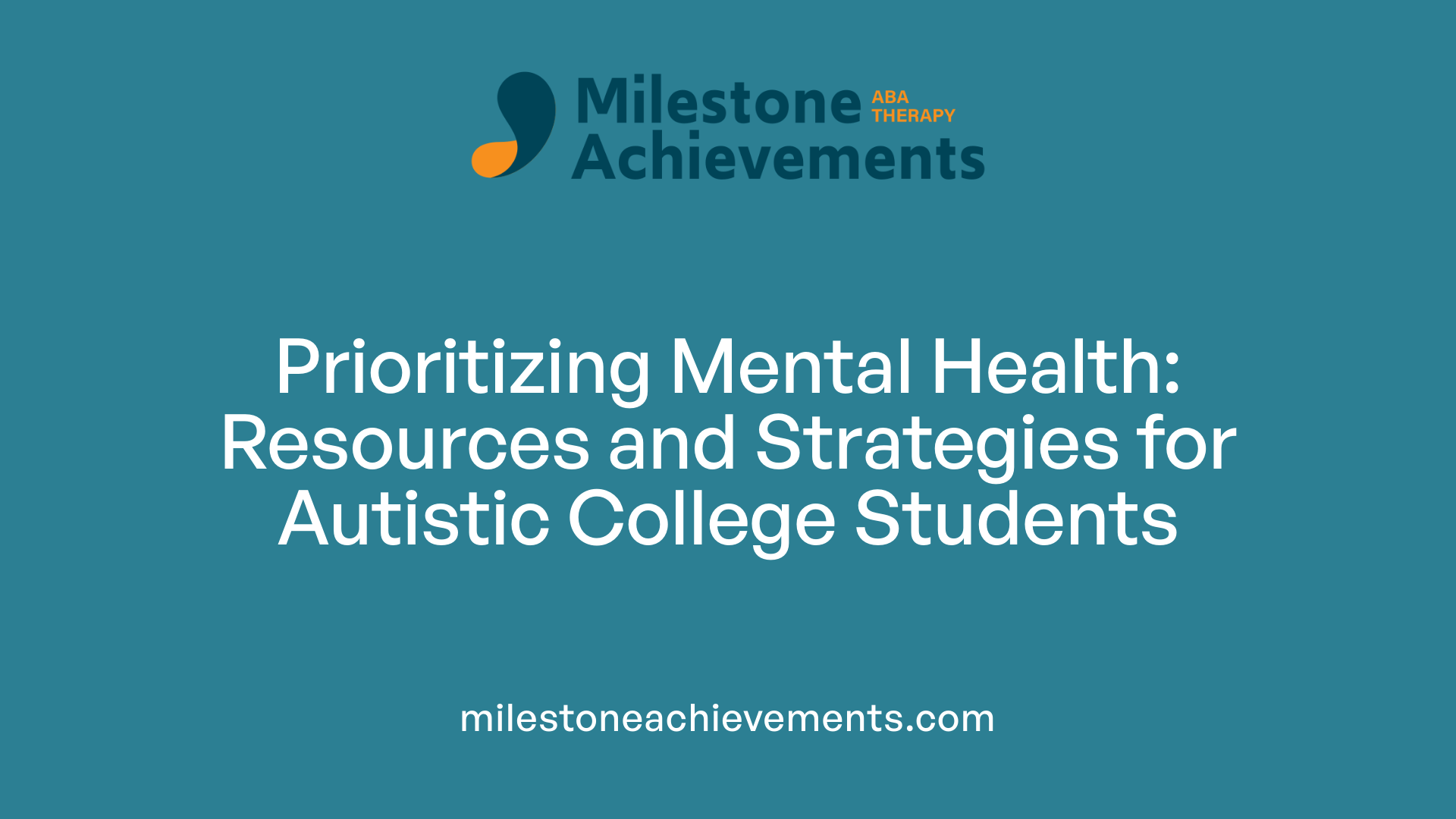
What are the mental health challenges faced by college students with autism?
Many students on the autism spectrum experience significantly higher levels of anxiety and depression compared to their neurotypical peers. These mental health struggles are often fueled by sensory overload, social difficulties, academic pressures, and uncertainties about their future. For example, sensory sensitivities—such as loud noises, bright lights, or crowded spaces—can be overwhelming, leading to heightened stress or panic.
Additionally, social challenges like interpreting social cues, forming friendships, and navigating complex social norms can cause feelings of loneliness and social isolation. The transition to college often exacerbates these issues, as students face unfamiliar routines and social environments. Academic demands, including managing heavy workloads and adapting to new teaching styles, compound stressors.
Poor emotional regulation, such as difficulty managing frustration, anger, or anxiety, further impacts mental health. Many students find themselves withdrawing or experiencing burnout, which affects both their academic performance and personal well-being. Recognizing these prevalent challenges emphasizes the importance of accessible, tailored mental health services, peer support networks, and interventions designed specifically for neurodiverse students.
How can colleges better support the emotional health of autistic students?
Educational institutions can undertake several strategies to bolster the mental well-being of students with autism. First, providing specialized mental health services within campus health centers—staffed by professionals trained in neurodiverse needs—is essential.
Creating safe, inclusive spaces where students can relax and express themselves helps alleviate stress and sensory overload. Structured social programs, such as social skills groups or peer mentorship, promote a sense of belonging and facilitate meaningful connections.
Faculty and staff training also play a vital role. When educators recognize signs of mental health struggles and respond empathetically, they can intervene early and provide appropriate accommodations.
Sensory-friendly environments, like quiet rooms or availability of sensory regulation tools (noise-canceling headphones, soothing lighting), can reduce feelings of overwhelm. Stress reduction resources—including mindfulness workshops, relaxation zones, and access to calming techniques—offer students practical ways to manage anxiety.
Integrating mental health support with broader disability services ensures comprehensive care that addresses academic and emotional needs concurrently. Overall, a proactive, holistic approach fosters resilience, enhances emotional well-being, and contributes to academic success.
What role does resilience and self-advocacy play in mental well-being during college?
Resilience and self-advocacy are fundamental in empowering students with autism to maintain their mental health and succeed academically. Resilience enables students to recover from setbacks caused by sensory overload, social misunderstandings, or academic challenges. Cultivating resilience involves fostering a growth mindset, teaching coping skills, and encouraging adaptability in face of adversity.
Self-advocacy skills allow students to effectively communicate their needs—whether requesting accommodations, accessing support services, or setting boundaries. This sense of agency diminishes feelings of helplessness and enhances confidence.
Training students in self-awareness helps them understand their own triggers and strengths, facilitating tailored coping strategies. Regularly practicing self-advocacy fosters independence, which directly reduces anxiety related to uncertainty and dependence.
By combining resilience-building activities with self-advocacy development, colleges can help students cultivate psychological strength, boost self-esteem, and develop sustainable strategies to navigate complex campus environments. These skills collectively promote mental well-being and prepare students for lifelong self-management.
Limitations of Current Support Services and Future Directions
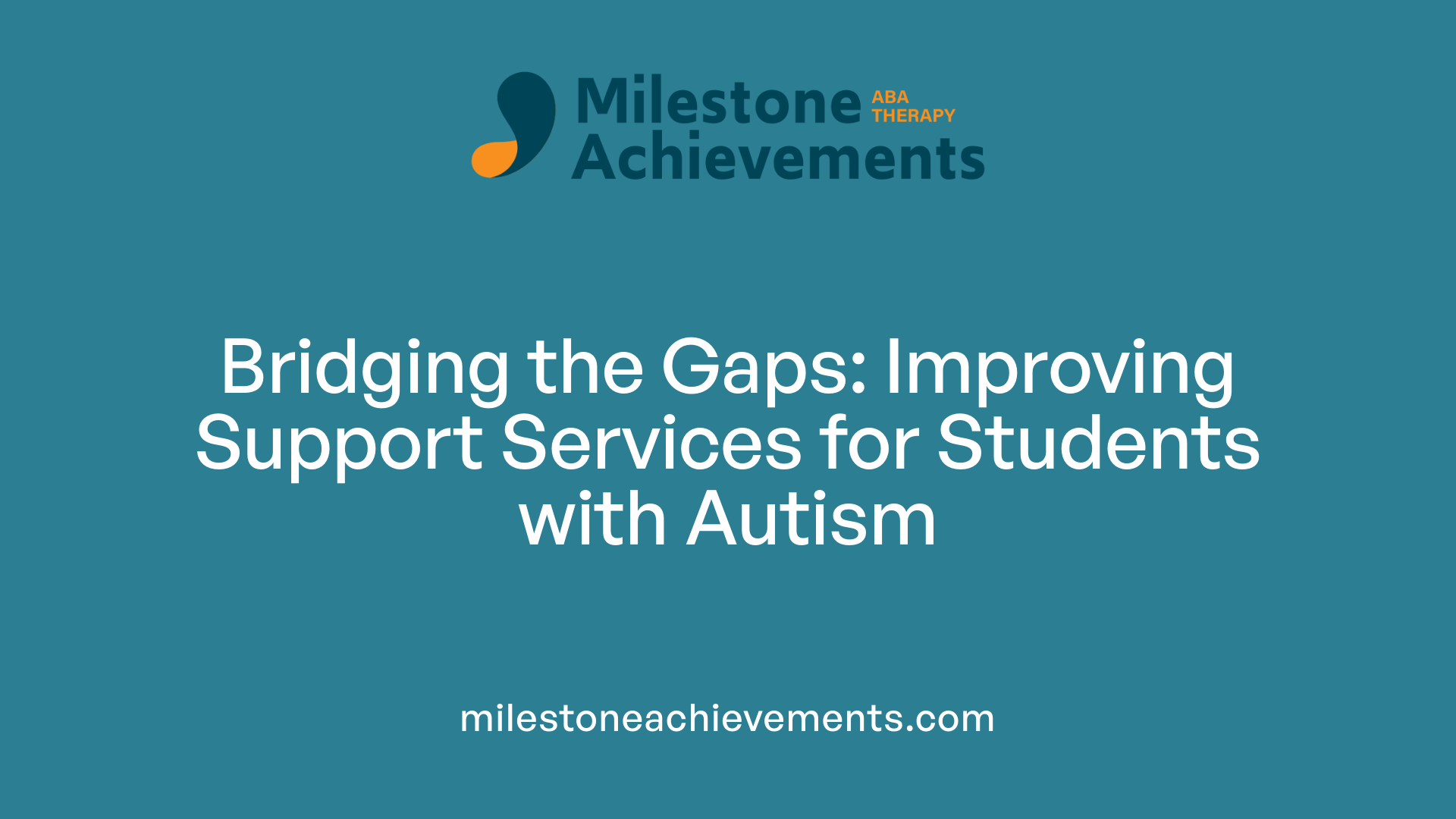
What are the shortcomings of current college support services for students with autism?
Support services for students with autism in colleges often have limitations that hinder their effectiveness. Many programs are constrained by limited resources, which restricts the scope and personalization of support. Staff members in disability services may lack specialized training in autism spectrum disorder, leading to a one-size-fits-all approach that does not fully address individual challenges.
Accessing accommodations can be complicated by bureaucratic hurdles; students may face difficulties in navigating application processes, and some services like sensory-friendly spaces or social supports are not always available or sufficient. Additionally, many students are hesitant to disclose their diagnosis due to stigma, which prevents them from fully utilizing support options.
Existing programs tend to focus primarily on academic adjustments, such as extended test time or note-taking services. However, they often neglect critical aspects like social integration, emotional wellbeing, and development of life skills necessary for independence.
This gap results in many students not receiving the comprehensive help they need, which contributes to lower graduation rates—averaging between 20% and 40% for students with ASD compared to approximately 70% for the general student population. Therefore, it is clear that current services require significant enhancements, including more specialized, proactive, and individualized support structures.
What strategies are recommended to improve support for autistic students in college?
To bridge these gaps, colleges should adopt a multi-faceted approach that includes creating tailored programs focusing on the whole student—academically, socially, and emotionally. Expanding training for faculty and staff on autism spectrum disorder is vital. Such training can improve understanding, increase awareness of neurodiversity, and equip staff with strategies for flexible communication and instruction.
Implementing sensory-friendly environments on campus, such as quiet rooms and spaces free of overwhelming stimuli, can significantly ease sensory overload issues. Peer mentoring programs can foster social connections and provide relatable support.
Increasing funding for specialized services like social skills training, vocational coaching, and mental health counseling is essential. It ensures students have access to ongoing assistance beyond academic accommodations.
Designing course materials and campus facilities according to universal design principles can make learning and campus navigation more accessible to all students.
Empowering students through self-advocacy workshops helps them learn to communicate their needs confidently and access resources effectively. Developing interconnected networks among disability services, counselors, peer programs, and faculty helps create a cohesive support system.
Furthermore, continuous research, feedback collection, and program evaluation are necessary to adapt and improve services to meet students' changing needs.
How can faculty and staff contributions be optimized to support students with autism?
Faculty and staff are pivotal in the success of students with autism. To maximize their positive impact, they should receive comprehensive training emphasizing the characteristics of autism, effective communication strategies, and inclusive teaching methods. This can include workshops on setting clear expectations, providing visual aids, and maintaining consistent routines to reduce student anxiety.
Creating an environment where faculty are aware of and responsive to signs of distress allows for timely support and referral. Encouraging open dialogue with students about their needs fosters trust and enables personalized accommodations.
Raising campus-wide awareness about neurodiversity promotes empathy among peers and staff, reducing stigma and fostering a supportive community.
Collaboration between disability offices, counselors, and faculty ensures accommodations are seamlessly integrated into coursework without disrupting academic standards. Regular meetings and check-ins help tailor support strategies and track progress.
Finally, establishing formal pathways for faculty-student interaction regarding individual support needs can lead to more effective interventions and improved educational outcomes. Such efforts foster an inclusive campus climate where students with autism are supported to succeed academically and socially.
Fostering an Inclusive and Supportive Higher Education Environment
Addressing the multifaceted challenges faced by college students with autism requires a comprehensive approach that includes early transition planning, tailored academic and social supports, faculty training, and ongoing campus initiatives to foster awareness and acceptance. By recognizing the unique strengths and needs of autistic students and implementing innovative, accessible programs, colleges can transform into inclusive spaces that empower these students to succeed academically, socially, and emotionally. The collective effort of educators, support staff, policymakers, and student communities is essential to closing existing gaps and promoting equitable opportunities for all learners on the spectrum.
References
- Autism and the College Experience
- Going to College With Autism - Child Mind Institute
- College on the Autism Spectrum - Higher Education Today
- Transitioning and Making Progress in College: Students with Autism
- Understanding the Experiences of Autistic College Students
- A Deep Dive into the Challenges of Autism in Higher Education -
- Navigating Challenges to Facilitate Success for College Students ...
- Academic Supports for College Students with an Autism Spectrum ...







